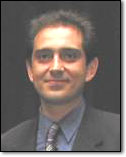
2005 IEEE International Conference on Acoustics, Speech, and Signal Processing
March 18-23, 2005 • Pennsylvania Convention Center/Marriott Hotel • Philadelphia, PA, USA
ICASSP
30th Anniversary
Tutorial TUT-14: Linear Algebra for Three-Way Arrays: A Signal Processing Perspective
Instructors
N. Sidiropoulos; TUC-Greece
Time & Location
Saturday, March 19, 13:30 - 16:30, Location: CC: Room 113-C
Abstract
Linear algebra plays an important role in modern signal processing. Various matrix decompositions are routinely used to prove results, and as building blocks in the construction of signal processing algorithms. In many signal processing applications of linear algebra tools, the signal part of a postulated model lies in a so-called signal subspace, while the parameters of interest are in one-to-one correspondence with a certain basis of this subspace. The signal subspace can often be reliably estimated from measured data, but the particular basis of interest cannot be identified without additional problem-specific structure. This is a manifestation of rotational indeterminacy, i.e., non-uniqueness of low-rank matrix decomposition. The situation is very different for three- or higher-way arrays, i.e., arrays indexed by three or more independent variables, for which low-rank decomposition is unique under mild conditions. This has fundamental implications for signal processing problems which deal with such data. Examples include blind singal separation and multiuser detection, multidimensional harmonic retrieval and DOA estimation, spatial signature estimation, MIMO wireless channel sounding, and constant-modulus signal separation. This tutorial will provide a guided tour of the basic elements of this theory, along with many examples of application in problems of current interest in the signal processing community. The goal is to provide attendees with sufficient understanding and motivation to think about applying these tools to their own research.
Prerequisites / target audience: Familiarity with basic linear algebra, at the first-year graduate level, would help the attendee make the most out of the tutorial. Some familiarity with spread-spectrum, multicarrier, and MIMO communications would help, but is not a prerequisite. Target audience: graduate students, but also more senior researchers interested in the area; applied mathematicians interested in learning about applications.
Presenter Information

Nicholas Sidiropoulos (Senior Member, IEEE) received the Diploma in Electrical Engineering from the Aristotelian University of Thessaloniki, Greece, and M.S. and Ph.D. degrees in Electrical Engineering from the University of Maryland at College Park (UMCP), in 1988, 1990 and 1992, respectively. From 1988 to 1992 he was a Fulbright Fellow and a Research Assistant at the Institute for Systems Research (ISR) of the University of Maryland. From September 1992 to June 1994 he served his military service as a Lecturer in the Hellenic Air Force Academy. From October 1993 to June 1994 he also was a member of the technical staff, Systems Integration Division, G-Systems Ltd., Athens - Greece. He has been a Postdoctoral Fellow (1994-1995) and Research Scientist (1996-1997) at ISR-UMCP, Assistant Professor in the Department of Electrical Engineering at the University of Virginia (1997-1999), and Associate Professor in the Department of Electrical and Computer Engineering at the University of Minnesota - Minneapolis (2000-2002). He is currently a Professor in the Telecommunications Division of the Department of Electronic and Computer Engineering at the Technical University of Crete, Chania - Crete, Greece, and Adjunct Professor at the University of Minnesota. His current research interests are primarily in signal processing for communications, and multi-way analysis. He is a member of the Signal Processing for Communications (SPCOM) and Sensor Array and Multichannel (SAM) processing Technical Committees of the IEEE SP Society, and currently serves his fifth year as Associate Editor for IEEE Transactions on Signal Processing. During 2000-2002, he also served as Associate Editor for IEEE Signal Processing Letters. Dr. Sidiropoulos received the NSF/CAREER award (Signal Processing Systems Program) in June 1998, and an IEEE Signal Processing Society best paper award in 2001. He is an active consultant for industry in the areas of frequency hopping systems and signal processing for xDSL modems.